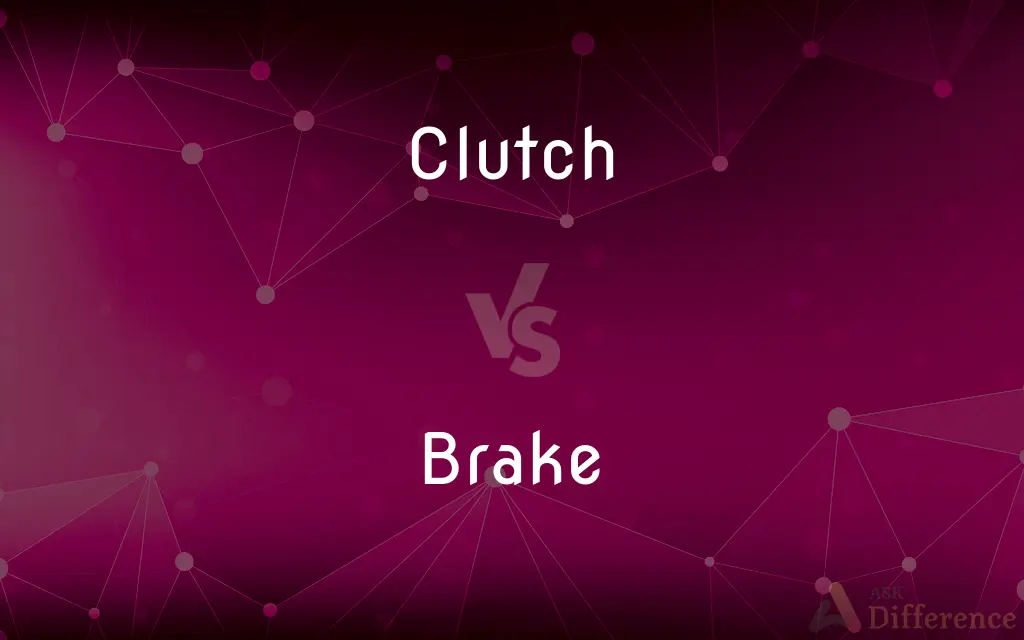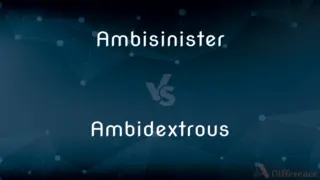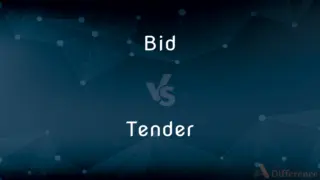Clutch vs. Brake — What's the Difference?
Edited by Tayyaba Rehman — By Fiza Rafique — Updated on October 24, 2023
"Clutch" is a device for engaging and disengaging gears, while "brake" is a device for slowing or stopping motion.

Difference Between Clutch and Brake
Table of Contents
ADVERTISEMENT
Key Differences
In the realm of vehicles, a "clutch" acts as a bridge, permitting the smooth transition between gears. Contrarily, a "brake" is a tool designed specifically to decelerate or bring a vehicle to a standstill.
Delving deeper, the "clutch" facilitates the connection and disconnection of two rotating shafts, ensuring that power from the engine reaches the wheels in a controlled manner. On the other hand, "brake" systems utilize friction to counteract and reduce the momentum of a moving vehicle.
It's also worth noting that a "clutch" predominantly finds its use in manual transmission vehicles, allowing drivers to change gears manually. Conversely, every vehicle, whether manual or automatic, requires a "brake" system to ensure safety and control.
Beyond the automotive context, both words carry broader meanings. "Clutch" can refer to grasping something tightly or a critical moment that demands decisive action. "Brake", though, could indicate a place where wild plants are broken up or a device for crushing and breaking substances.
In essence, while the primary function of a "clutch" is about control and transition in power transmission, a "brake" is all about halting or decelerating movement.
ADVERTISEMENT
Comparison Chart
Primary Function
Engage and disengage gears
Slow or stop motion
Context of Use
Mostly in manual transmission vehicles
All vehicles
Mechanism
Connects two rotating shafts
Uses friction to reduce momentum
Broader Meanings
Grasping or critical moments
Crushing or breaking up substances
Associated with Safety
Indirectly, as it controls gear transitions
Directly, as it halts or reduces speed
Compare with Definitions
Clutch
A tight grasp or grip.
She held the papers in a firm clutch.
Brake
A device to slow or stop a vehicle or machine.
He applied the brake as the light turned red.
Clutch
A small handbag without handles or straps.
She carried a stylish clutch to the party.
Brake
An area of rough terrain used for breaking up plants.
The deer sought shelter in the brake.
Clutch
A hatch of eggs.
The hen guarded her clutch of chicks.
Brake
A device for crushing or breaking substances.
He used a brake to crush the grain.
Clutch
A clutch is a mechanical device that engages and disengages power transmission, especially from a drive shaft (driving shaft) to a driven shaft. In the simplest application, clutches connect and disconnect two rotating shafts (drive shafts or line shafts).
Brake
A brake is a mechanical device that inhibits motion by absorbing energy from a moving system. It is used for slowing or stopping a moving vehicle, wheel, axle, or to prevent its motion, most often accomplished by means of friction.
Clutch
To grasp and hold tightly
A child clutching a blanket.
Brake
A device for slowing or stopping a moving vehicle, typically by applying pressure to the wheels
He slammed on his brakes
A brake pedal
Clutch
To seize; snatch
Clutched the banana from my hand.
Brake
Another term for brake van
Clutch
To attempt to grasp or seize
Clutch at a life raft.
Brake
An open horse-drawn carriage with four wheels.
Clutch
To engage or disengage a motor vehicle's clutch.
Brake
A toothed instrument used for crushing flax and hemp.
Clutch
To hatch (chicks).
Brake
A thicket.
Clutch
A hand, claw, talon, or paw in the act of grasping.
Brake
A coarse fern of warm and tropical countries, frequently having the fronds divided into long linear segments.
Clutch
A tight grasp.
Brake
Make a moving vehicle slow down or stop by using a brake
She had to brake hard to avoid a milk float
Clutch
Often clutches Control or power
Caught in the clutches of sin.
Brake
A device for slowing or stopping motion, as of a vehicle, especially by contact friction.
Clutch
A device for gripping and holding.
Brake
Something that slows or stops action.
Clutch
Any of various devices for engaging and disengaging two working parts of a shaft or of a shaft and a driving mechanism.
Brake
A toothed device for crushing and beating flax or hemp.
Clutch
The apparatus, such as a lever or pedal, that activates one of these devices.
Brake
A heavy harrow for breaking clods of earth.
Clutch
A tense, critical situation
Came through in the clutch.
Brake
An apparatus for kneading large amounts of dough.
Clutch
A small, strapless purse that is carried in the hand.
Brake
A machine for bending and folding sheet metal.
Clutch
The complete set of eggs produced or incubated at one time.
Brake
A lever or handle on a machine such as a pump.
Clutch
A brood of chickens.
Brake
Any of various ferns of the genus Pteris having pinnately compound leaves and including several popular houseplants.
Clutch
A group; a bunch.
Brake
Any of certain other ferns, such as bracken.
Clutch
Being or occurring in a tense or critical situation
Won the championship by sinking a clutch putt.
Brake
An area overgrown with dense brushwood, briers, and undergrowth; a thicket.
Clutch
Tending to be successful in tense or critical situations
The coach relied on her clutch pitcher.
Brake
A high horse-drawn carriage with four wheels.
Clutch
To seize, as though with claws.
To clutch power
Brake
To reduce the speed of with or as if with a brake.
Clutch
To grip or grasp tightly.
She clutched her purse tightly and walked nervously into the building.
Brake
To operate or apply a brake.
Clutch
(video games) To win in a 1vX (one versus X) situation.
Brake
To be slowed or stopped by or as if by the operation of a brake.
Clutch
To unexpectedly or luckily succeed in a difficult activity.
Brake
To crush (flax or hemp) in a toothed device.
Clutch
(transitive) To hatch.
Brake
To break up (clods of earth) with a harrow.
Clutch
The claw of a predatory animal or bird.
Brake
A past tense of break.
Clutch
(by extension) A grip, especially one seen as rapacious or evil.
Brake
A device used to slow or stop the motion of a wheel, or of a vehicle, usually by friction (although other resistive forces, such as electromagnetic fields or aerodynamic drag, can also be used); also, the controls or apparatus used to engage such a mechanism such as the pedal in a car.
Clutch
A device to interrupt power transmission, commonly used to separate the engine and gearbox in a car.
Brake
The act of braking, of using a brake to slow down a machine or vehicle
Clutch
The pedal in a car that disengages power and torque transmission from the engine (through the drivetrain) to the drive wheels.
Brake
(engineering) An apparatus for testing the power of a steam engine or other motor by weighing the amount of friction that the motor will overcome; a friction brake.
Clutch
Any device for gripping an object, as at the end of a chain or tackle.
Brake
(figuratively) Something used to retard or stop some action, process etc.
Clutch
A fastener that attaches to the back of a tack pin to secure an accessory to clothing. Clutch (pin fastener).}}
Brake
(military) An ancient engine of war analogous to the crossbow and ballista.
Clutch
A small handbag or purse with no straps or handle.
Brake
(obsolete) The winch of a crossbow.
Clutch
A brood of chickens or a sitting of eggs.
Brake
The handle of a pump.
Clutch
A group or bunch (of people or things).
Brake
A baker's kneading trough.
Clutch
(US) An important or critical situation.
Brake
A device used to confine or prevent the motion of an animal.
Clutch
A difficult maneuver
Brake
A frame for confining a refractory horse while the smith is shoeing him.
Clutch
Performing or tending to perform well in difficult, high-pressure situations.
Brake
An enclosure to restrain cattle, horses, etc.
Clutch
A gripe or clinching with, or as with, the fingers or claws; seizure; grasp.
An expiring clutch at popularity.
But Age, with his stealing steps,Hath clawed me in his clutch.
Brake
A cart or carriage without a body, used in breaking in horses.W
Clutch
The hands, claws, or talons, in the act of grasping firmly; - often figuratively, for power, rapacity, or cruelty; as, to fall into the clutches of an adversary.
I must have . . . little care of myself, if I ever more come near the clutches of such a giant.
Brake
A carriage for transporting shooting parties and their equipment.W
Clutch
A device which is used for coupling shafting, etc., so as to transmit motion, and which may be disengaged at pleasure.
Brake
That part of a carriage, as of a movable battery, or engine, which enables it to turn.
Clutch
Any device for gripping an object, as at the end of a chain or tackle.
Brake
A fern; bracken (Pteridium).
Clutch
The nest complement of eggs of a bird.
Brake
Any fern in the genus Pteris
Clutch
To seize, clasp, or grip with the hand, hands, or claws; - often figuratively; as, to clutch power.
A man may set the poles together in his head, and clutch the whole globe at one intellectual grasp.
Is this a dagger which I see before me . . . ?Come, let me clutch thee.
Brake
A thicket, or an area overgrown with briers etc.
Clutch
To close tightly; to clinch.
Not that I have the power to clutch my hand.
Brake
A tool used for breaking flax or hemp.
Clutch
To reach (at something) as if to grasp; to catch or snatch; - often followed by at.
Brake
A type of machine for bending sheet metal. (See wikipedia.)
Clutch
To become too tense or frightened to perform properly; used sometimes with up; as, he clutched up on the exam.
Brake
A large, heavy harrow for breaking clods after ploughing; a drag.
Clutch
The act of grasping;
He released his clasp on my arm
He has a strong grip for an old man
She kept a firm hold on the railing
Brake
(obsolete) A cage.
Clutch
A tense critical situation;
He is a good man in the clutch
Brake
A type of torture instrument.
Clutch
A number of birds hatched at the same time
Brake
(intransitive) To operate (a) brake(s).
Clutch
A collection of things or persons to be handled together
Brake
(intransitive) To be stopped or slowed (as if) by braking.
Clutch
A pedal that operates a clutch
Brake
(transitive) To bruise and crush; to knead
The farmer's son brakes the flax while mother brakes the bread dough
Clutch
A coupling that connects or disconnects driving and driven parts of a driving mechanism
Brake
(transitive) To pulverise with a harrow
Clutch
Take hold of; grab;
The salesclerk quickly seized the money on the counter
She clutched her purse
The mother seized her child by the arm
Birds of prey often seize small mammals
Brake
(archaic) break
Clutch
Hold firmly, usually with one's hands;
She clutched my arm when she got scared
Brake
A fern of the genus Pteris, esp. the Pteris aquilina, common in almost all countries. It has solitary stems dividing into three principal branches. Less properly: Any fern.
Clutch
Affect;
Fear seized the prisoners
The patient was seized with unberable pains
He was seized with a dreadful disease
Brake
A thicket; a place overgrown with shrubs and brambles, with undergrowth and ferns, or with canes.
Rounds rising hillocks, brakes obscure and rough,To shelter thee from tempest and from rain.
He stayed not for brake, and he stopped not for stone.
Clutch
A device for connecting and disconnecting gears.
He pressed the clutch to shift into first gear.
Brake
An instrument or machine to break or bruise the woody part of flax or hemp so that it may be separated from the fiber.
Clutch
A crucial moment requiring decisive action.
The game's outcome depended on that clutch play.
Brake
An extended handle by means of which a number of men can unite in working a pump, as in a fire engine.
Brake
A baker's kneading though.
Brake
A sharp bit or snaffle.
Pampered jades . . . which need nor break nor bit.
Brake
A frame for confining a refractory horse while the smith is shoeing him; also, an inclosure to restrain cattle, horses, etc.
A horse . . . which Philip had bought . . . and because of his fierceness kept him within a brake of iron bars.
Brake
That part of a carriage, as of a movable battery, or engine, which enables it to turn.
Brake
An ancient engine of war analogous to the crossbow and ballista.
Brake
A large, heavy harrow for breaking clods after plowing; a drag.
Brake
A piece of mechanism for retarding or stopping motion by friction, as of a carriage or railway car, by the pressure of rubbers against the wheels, or of clogs or ratchets against the track or roadway, or of a pivoted lever against a wheel or drum in a machine.
Brake
An apparatus for testing the power of a steam engine, or other motor, by weighing the amount of friction that the motor will overcome; a friction brake.
Brake
A cart or carriage without a body, used in breaking in horses.
Brake
An ancient instrument of torture.
Brake
A restraint used to slow or stop a vehicle
Brake
Any of various ferns of the genus Pteris having pinnately compound leaves and including several popular houseplants
Brake
Large coarse fern often several feet high; essentially weed ferns; cosmopolitan
Brake
An area thickly overgrown usually with one kind of plant
Brake
Stop travelling by applying a brake;
We had to brake suddenly when a chicken crossed the road
Brake
Cause to stop by applying the brakes;
Brake the car before you go into a curve
Brake
A pause or interruption.
The holiday provided a brake from work.
Brake
A tool for bending metal.
The worker shaped the sheet metal with a brake.
Common Curiosities
How often should brakes be replaced?
Typically, every 50,000 miles, but it varies based on usage and conditions.
Why might a clutch "slip"?
It might be worn out, or there could be an oil leak causing slippage.
Can a vehicle function without a clutch?
In manual transmission vehicles, no; a clutch is essential for gear transitions.
Is it harmful to constantly press the brake?
Yes, excessive or abrupt braking can wear out brake pads and reduce their lifespan.
How does a clutch contribute to fuel efficiency?
A properly functioning clutch ensures smooth gear transitions, optimizing fuel use.
Does every car have a clutch?
No, only manual transmission cars and some automatics have a clutch.
What's the consequence of overusing the brake?
Overuse can cause overheating and reduce braking efficiency.
Is "clutch" only associated with vehicles?
No, it also refers to a grasp, a handbag, a critical moment, and more.
Is engine braking the same as using brakes?
No, engine braking uses the engine's resistance to slow down, not the brake system.
Why is clutch control important in driving?
It ensures smooth vehicle movement and prevents stalling.
Why might a brake make a squeaking noise?
It often indicates that brake pads are wearing thin and need replacement.
How does a clutch work?
It connects and disconnects the engine from the wheels, allowing gear changes.
Can brakes be "too sharp"?
Yes, if brakes respond too abruptly, they may need adjustment.
How can I tell if my clutch needs replacement?
Signs include a slipping clutch, a burning smell, or difficulty changing gears.
Why do brakes have fluids?
Brake fluid transmits the force of your foot on the pedal to the brakes.
Share Your Discovery

Previous Comparison
Ambisinister vs. Ambidextrous
Next Comparison
Bid vs. TenderAuthor Spotlight
Written by
Fiza RafiqueFiza Rafique is a skilled content writer at AskDifference.com, where she meticulously refines and enhances written pieces. Drawing from her vast editorial expertise, Fiza ensures clarity, accuracy, and precision in every article. Passionate about language, she continually seeks to elevate the quality of content for readers worldwide.
Edited by
Tayyaba RehmanTayyaba Rehman is a distinguished writer, currently serving as a primary contributor to askdifference.com. As a researcher in semantics and etymology, Tayyaba's passion for the complexity of languages and their distinctions has found a perfect home on the platform. Tayyaba delves into the intricacies of language, distinguishing between commonly confused words and phrases, thereby providing clarity for readers worldwide.
















































